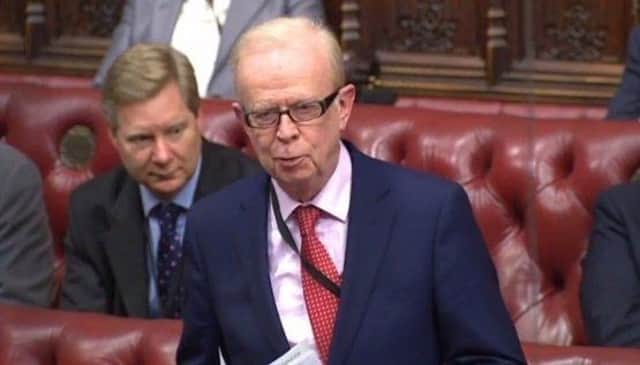Support for agri bill amendments


This amendment would require the government to provide regulations for fair dealing obligations of business purchasers of agricultural products.
Lord Empey said: “I am sure that we would like to see a day when farmers were not reliant on subsidies to maintain a sustainable income, but on the other side of the coin, it would not be possible to encourage a rise in food prices when so many people in this country are suffering from food poverty as it is.
Advertisement
Advertisement
“The fundamental point I wish to make with this amendment is that the distribution of income within the sector, from the production of food to the retail sector, is not balanced.
“It is fundamentally unfair. For many years, it has been the case that profit margins within the processing and retailing sectors can be substantially more while the primary producer, the farmer, can barely make a profit on the produce at all.”
He added: “During the past two decades, there has been significant consolidation within the retail and food processing sectors, adding to an imbalance in the market. Primary producers generally do not obtain fair prices and on many occasions do not cover the costs of production. This situation requires political intervention to protect what remains of our farming sector and to assist its rebuilding. We know about imports, weather and other factors, but the fact is that there is a persistent imbalance in the distribution of wealth within the sector from the primary producer to the retailer.
“We are at a point of almost generational change with this Bill and this is an opportunity to reset the clock on how we do this fairly and reasonably. We know that we want to see more food produced in the UK, and we want that food to be of an even higher quality than it is now.
Advertisement
Advertisement
“We want to see standards maintained. However, we also need investment by the primary producer, and a primary producer cannot invest properly in that business unless they are making money. Therefore, it is in all our long-term interests to take this opportunity to take positive action to assist our farming community.”
Lord Empey concluded: “It is not simply to add costs to the sale of food in shops, it is to help with the equitable distribution of income and reflect a reasonable return on capital in the profits a farmer can make. That is nothing dramatic; all businesses need that, and I do not see why it should be any different with primary producers.”
Meanwhile, former Ulster Unionist MEP Jim Nicholson has claimed that the Agriculture Bill, which passed its third reading in the House of Commons at the end of May, will be a total disaster for agriculture in Northern Ireland. He continued:
“There is nothing good in this Bill. It is mind boggling that any MP from Northern Ireland would vote for it.”
Advertisement
Advertisement
Mr Nicholson’s comments come in the wake of the decision taken by all eight MPs from the Democratic Unionist Party to vote in favour of the proposed legislation. The SDLP’s two representatives in the House of Commons voted against the measure, as did Stephen Farry from the Alliance Party.
Mr Nicholson continued: “The Bill opens the flood gates to cheap food imports into the UK from around the world. This food will not have been produced to the same standards achieved consistently by farmers in Northern Ireland.
“These imports will serve to drive markets down at a time when local farmers are under tremendous pressure. Cheap food, produced under who-knows-what standards, is the last thing that the farming and food sectors in Northern Ireland should be expected to compete with.
“The last thing farmers here need is the prospect of facing unfair competition on what is their home market.”